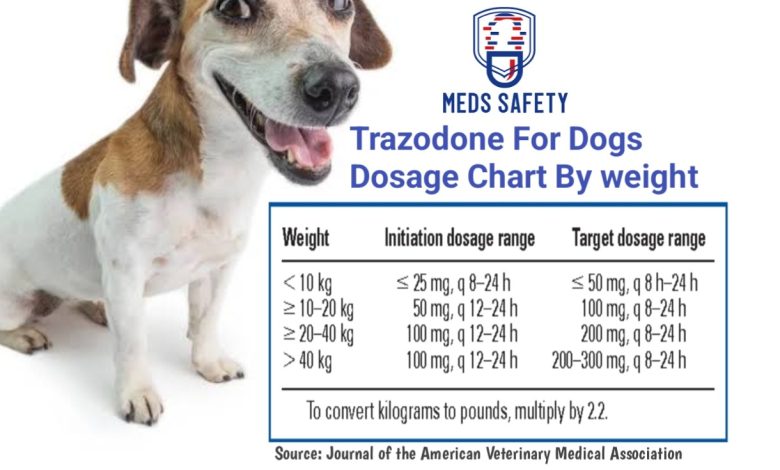Trazodone For Dogs: Dosage Chart By Weight

Trazodone is a medication that is sometimes prescribed by veterinarians for dogs to treat various behavioral issues and anxiety-related conditions. It is not approved by the FDA for veterinary use, but it is often used off-label because of its potential benefits. Trazodone is an atypical antidepressant that can have a sedative effect, which can be helpful in calming anxious or agitated dogs.
Here are some common reasons a veterinarian might prescribe trazodone for dogs:
1. Anxiety: Trazodone can help alleviate anxiety in dogs, such as separation anxiety, thunderstorm or fireworks phobias, and general anxiety disorders.
2. Aggression: In some cases, trazodone may be used to reduce aggression in dogs, particularly in situations where it’s challenging to manage their behavior.
3. Noise aversion: Dogs that become extremely anxious or fearful during loud noises like fireworks or thunderstorms can benefit from trazodone to help them remain calm.
4. Travel anxiety: For dogs that experience anxiety during car rides or other forms of travel, trazodone can be prescribed to ease their distress.
5. Veterinary visits: Trazodone can be used to help dogs relax during veterinary visits, making the experience less stressful for both the dog and the veterinarian.
It’s important to note that trazodone should only be used under the guidance and supervision of a licensed veterinarian. The dosage and duration of treatment will depend on the dog’s specific condition and needs. Additionally, potential side effects and interactions with other medications should be discussed with a veterinarian before administering trazodone to your dog.
Never give your dog any medication, including trazodone, without a prescription or guidance from a qualified veterinarian, as the wrong dosage or usage can lead to adverse effects or complications. Your vet will assess your dog’s individual situation and determine whether trazodone is an appropriate treatment option.
Side Effects
Trazodone, when prescribed and administered correctly by a veterinarian, is generally considered safe for dogs. However, like any medication, it can potentially cause side effects. Common side effects of trazodone in dogs may include:
1. Sedation: One of the primary effects of trazodone is sedation, which can help calm anxious dogs. However, excessive sedation can lead to drowsiness, lethargy, or even difficulty walking.
2. Gastrointestinal Upset: Some dogs may experience mild gastrointestinal issues, such as diarrhea, vomiting, or appetite changes. These side effects are generally mild and temporary.
3. Lack of Coordination: Dogs taking trazodone might exhibit clumsiness or a lack of coordination. This is typically a transient side effect, but it can be concerning if the dog is at risk of injury.
4. Increased Heart Rate: In some cases, trazodone may cause an elevated heart rate (tachycardia). If this occurs, consult your veterinarian.
5. Behavior Changes: While trazodone is used to modify behavior, some dogs may exhibit unusual or unexpected behavior changes as a side effect. It’s essential to monitor your dog closely for any concerning behavior changes.
6. Allergic Reactions: In rare cases, dogs can have an allergic reaction to trazodone, which might manifest as hives, swelling of the face or limbs, or difficulty breathing. Seek immediate veterinary attention if you suspect an allergic reaction.
7. Other Side Effects: Less common side effects can include restlessness, aggression, drooling, and other atypical behaviors.
It’s important to remember that the likelihood and severity of side effects can vary from one dog to another. The dosage, the specific condition being treated, and the individual dog’s response all play a role in determining the side effects experienced. If your dog experiences any unusual or severe side effects, contact your veterinarian immediately.
As with any medication, it’s crucial to use trazodone for dogs only under the guidance of a qualified veterinarian. They will determine the appropriate dosage and monitor your dog’s response to the medication to ensure its safety and effectiveness. Additionally, always follow your veterinarian’s instructions regarding the administration of trazodone and any adjustments to the treatment plan.





